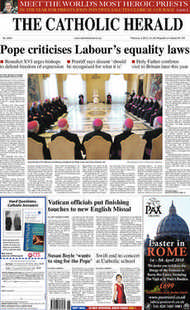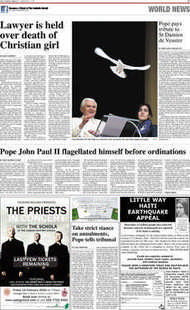Page 3, 5th February 2010
Page 3

Report an error
Noticed an error on this page?If you've noticed an error in this article please click here to report it.
Tags
Share
Related articles
Cardinal Announces Vatican U-turn On Interfaith Council
Pope Criticises Labour’s Equality Laws
The Pope Brings Hope To American Church In Wake Of Abuse...
Pope Brings Brazilian Prelate To Rome
Ex-anglican Father And Son Are Ordained As Catholic Priests
Queen’s adviser met archbishop privately
Queen asked Lord Chamberlain to speak to Archbishop Nichols about Pope’s offer to Anglicans
BY MARK GREAVES AND EDWARD PENTIN IN ROME
THE QUEEN sent her senior adviser to talk privately to Archbishop Vincent Nichols of Westminster about the Pope’s new provision for Anglicans, it has emerged.
Earl Peel, the Lord Chamberlain, met Archbishop Nichols in November following media coverage that portrayed the Pope’s move as an attempt to “poach” Anglicans.
According to an unnamed source, the Queen was “unhappy” about some aspects of the scheme, which would allow groups of Anglicans to enter into full communion with Rome while retaining aspects of their Anglican heritage.
A spokesman for the Archbishop said it was “a very successful meeting and mutually beneficial”, adding: “It gave the Archbishop the opportunity to correct some of the misunderstandings about the Apostolic Constitution created by misreporting in the media.” The decision to send the Lord Chamberlain rather than the Archbishop of Canterbury, Dr Rowan Williams, has been interpreted by some as a breach of protocol.
But Archbishop Nichols, at a press conference in Rome, said the Lord Chamberlain “wanted to get his mind around it” and that the Queen had not been upset.
Pope Benedict XVI published his Apostolic Constitution, Anglicanorum Coetibus, in November, outlining plans to allow Anglican parishes to be received en masse.
The document envisaged the creation of Personal Ordinariates, similar to military dioceses, for groups of converts. It was a response to requests for “corporate reunion” with the Catholic Church from about 30 Anglican bishops around the world.
But, as the Archbishop of Canterbury said at the time, parts of the British media viewed it as “a dawn raid on the Anglican Communion”.
The Queen, who is Supreme Governor of the Church of England, is expected to meet Pope Benedict XVI when he visits Britain in September. She issued a formal invitation to him last month and is likely to welcome him when he arrives in Scotland, either at Holyrood Palace or Balmoral.
The situation is made more delicate by the fact that some Anglo-Catholic bishops and clergy say they will decide whether to take up the Pope’s offer after the Anglican General Synod in July – just two months before the Pope’s trip.
A high-level commission of Catholic bishops has been set up to prepare for the reception of Anglicans.
It will include Archbishop Nichols, Archbishop Bernard Longley of Birmingham and Bishop Malcolm McMahon of Nottingham, all of whom are highly experienced in ecumenical dialogue.
Archbishop Nichols said: “The Apostolic Constitution gives us the end game but not the process. It is up to us, working with the Church of England, to look at the process.” Archbishop Nichols, in his address to Pope Benedict XVI this week, said the Pope’s offer had not seriously threatened ecumenical relations. He also emphasised that a third round of discussions would take place by the Anglican Roman Catholic International Commission (ARCIC), a body set up in 1967 that has faltered recently over the Anglican ordination of women and actively gay men.
The archbishop said: “Years of close co-operation and deepening friendship and communion with our broth ers and sisters in the Church of England have helped us to ensure that the various interpretations of and reactions to Anglicanorum Coetibus have not seriously disrupted the relationships between our ecclesial communions.
“Indeed the commitment to commence a third round of discussions as part of the work of the Anglican Roman Catholic International Commission has reinforced this relationship.
“We remain ready to explore with those Anglicans in England and Wales who wish to take up your generous and paternal response to their requests the ways forward towards full communion. We ask for your prayers in these important and sensitive matters,” the archbishop said.
The Queen has never met Benedict XVI, although she did meet John Paul II three times: in 1980, 1982 and 2000. At the first meeting in Rome she made the historic step of inviting him to visit Britain.
She said at that meeting: “We support the growing movement of unity between the Christian churches throughout the world and we pray that your Holiness’s visit to Britain may enable us all to see more clearly those truths which both unite and divide us in a new and constructive light.” Asked about the meeting between Lord Chamberlain and Archbishop Nichols a spokesman for Buckingham Palace said: “We never comment on private conversations.”
blog comments powered by Disqus





















